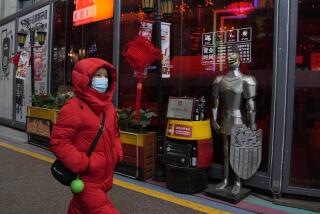Expectations grow that China will revalue yuan
- Share via
Reporting from Beijing — As international pressure mounts, expectations are rising that China will lift its currency peg to the U.S. dollar and allow the yuan to appreciate modestly in the coming weeks or months.
A change in policy would combat inflation and defuse some of the anger directed at Beijing for protecting its exports with a weak currency, economists say.
“A move appears to be imminent, but a larger . . . appreciation is unlikely,” said Ben Simpfendorfer, chief China economist for the Royal Bank of Scotland, one of several economists from leading banks predicting a revaluation.
Consensus is growing among analysts that China will gradually strengthen its currency 3% to 5% against the dollar over the course of the year. That would fall far short of the demands of U.S. labor groups and manufacturers that believe the yuan is undervalued by 25% or more.
Still, the small increase could create some goodwill at a time when American and Chinese leaders are seemingly determined to protect jobs at all costs, even if that means a trade war, experts say.
A report released last week by the Economic Policy Institute in Washington said 2.4 million Americans had lost jobs to China since it joined the World Trade Organization in 2001.
Some U.S. lawmakers are pushing the Treasury Department to label China a currency manipulator, a designation that could impose new duties on Chinese products.
In China, the issue has taken on heated nationalistic tones with the Ministry of Commerce leading the charge as an advocate for the country’s exporters, saying a revaluation would do little to reduce trade imbalances. Premier Wen Jiabao has accused Washington of politicizing the debate and denied that the yuan was undervalued.
Some experts believe a symbolic revaluation will fail to cool tensions.
“A 3% to 5% increase does absolutely nothing to appease the Americans,” said Andy Xie, an independent economist in Shanghai. “The fight is going to go to the brink.”
The yuan, also known as the renminbi, is not a convertible currency like the dollar, euro or Japanese yen, meaning it can’t be bought or sold on the international market. China has kept its exchange rate within a tightly controlled range in recent years to ensure that Chinese goods sold overseas remain cheap.
The yuan’s exchange rate has risen from 8.07 to the dollar five years ago to 6.83 today. China essentially pegged its currency to the greenback in July 2008, allowing it to shift no more than 0.5% in either direction. The move was justified as a way to guard against fluctuations against the dollar -- the world’s primary currency for trade -- during the peak of the financial crisis.
But China’s economy has bounced back strongly. Economic growth is expected to reach 11% in the first quarter. Figures released Thursday showed that manufacturing activity in the country expanded for the 13th consecutive month in March.
Some analysts said China should seize the opportunity to speed efforts to shift the economy away from export-led growth. In theory, an appreciation of the yuan would boost household wealth by making imports more affordable to Chinese consumers.
“This would also be a good time to move on the [yuan] -- when growth is strong and before international pressures have become too intense for the domestic palate,” said Tao Wang, head of China research at UBS Securities, in a report released Thursday.
Wang expects the yuan to rise to 6.4 to the dollar by the end of the year.
Even some Chinese officials are suggesting that the time is ripe for Beijing to remove the dollar peg and allow the yuan to fluctuate within a wider band.
Cheng Siwei, an influential former legislator, said in a speech in Shanghai on Wednesday that such a move would reduce pressure on the People’s Bank of China to continually intervene.
To keep the value of the yuan down, the central bank has to jettison billions of dollars in foreign currency each month, parking the assets mostly in U.S. Treasury bonds that Cheng believes leave China vulnerable.
“We can expand the [band] . . . when the government’s management level improves, and finally make the Chinese yuan a fully convertible currency,” he said.
Cheng reflects the opinion of many Chinese economists who favor a move to a more market-oriented exchange rate, but at a pace that won’t undermine economic growth and stability.
Economists said exchange-rate reform could help ease inflationary pressure, which has grown the last eight months. Inflation has been fueled by record bank lending to kick-start the economy and by the central bank’s continued printing of new money to keep the exchange rate down. Officials also blame illegal flows of foreign money into the country by speculators looking to profit from a possible revaluation.
Michael Pettis, a professor of finance at Peking University, estimates that the so-called hot money in-flows could exceed $100 billion annually.
Though he expects China to allow its currency to appreciate this year, Pettis said exchange-rate policy continues to divide Chinese policymakers.
“There’s a ferocious debate going on,” he said. “Both sides are right. It’s a question of whether short-term employment is more important or long-term imbalances [are] more important.”
Tommy Yang and Nicole Liu in The Times’ Beijing bureau contributed to this report.
More to Read
Sign up for Essential California
The most important California stories and recommendations in your inbox every morning.
You may occasionally receive promotional content from the Los Angeles Times.














